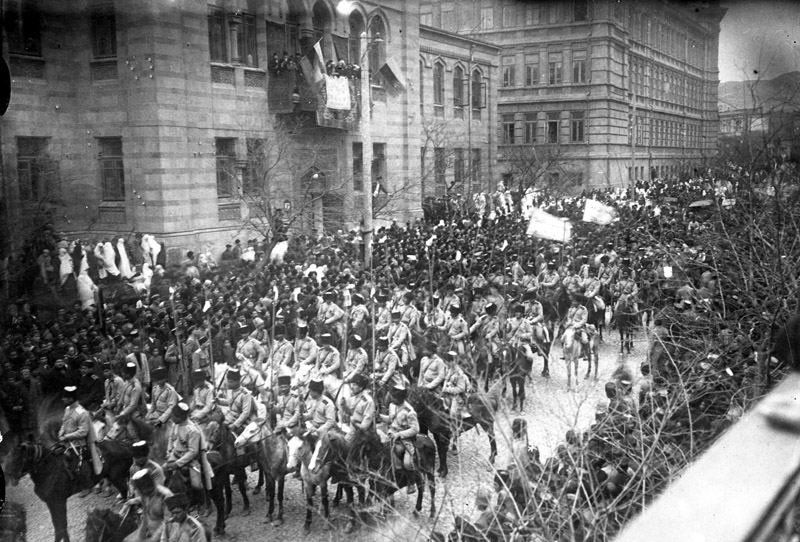Caucasus Islamic Army: Savior of nation

By Vugar Khalilov
- In 2022, Baku marks 104th anniversary of liberation from Armenian-Bolshevik bandit groups
- Legendary commander Nuri Pasha at the helm of Caucasus Islamic Army (CIA)
- The CIA plays crucial role in formation of proper institutions of ADR amid chaos in the region
- Azerbaijan cherishes contribution & services of CIA to establishment of first democratic republic in the east
Azerbaijan marked the 104th anniversary of Baku's liberation from the occupation of the Armenian and Bolshevik bandit groups by the Caucasus Islamic Army on September 15.
On September 15, 1918, the Caucasus Islamic Army, led by Nuri Pasha (1889-1949), entered Baku together with units of the national army of the newly-established Azerbaijani Democratic Republic (1918-1920), liberated the city from the Armenian-Bolshevik invaders at the expense of thousands of martyrs, and played an unparalleled historical role in establishing the city as the capital of Azerbaijan.
All in all, 1,132 fighters of the Caucasus Islamic Army became martyrs during the liberation of Baku.
At that point, when the city was liberated, the independence of Azerbaijan was just declared, and no official institutions were functional yet. The newly-found republic without Baku amid the savage conflict of interests and the geopolitical war for the country's rich resources was described by the republic's founders as a headless body.
Azerbaijan restored its territorial integrity by standing side by side with its brothers of blood and faith, putting an end to the chaos, violence, looting, and persecution in Baku, as well as other regions. The entire nation, including the capital city, was awash in victory.
The liberation of Baku on September 15, 1918, marked the culmination of the Ottoman army's advance into the Caucasus, which was an unprecedented historical event. The Caucasus Islamic Army was established, without seeking any material or political gain, to free the Azerbaijani people from the oppression of the period's ruthless murderers, who had no mercy for young people, women, or the elderly.
The Caucasus Islamic Army was formed towards the end of the First World War (1914-1918). Nuri Pasha Killigil, the unit's commander, was given the responsibility of serving as the Ottoman state's principal representative in the Caucasus at the start of the army-building process.
The military unit was named The Caucasus Islamic Army, since it had not any non-Muslims among the personnel and the army’s sole purpose was to provide military support to the Azerbaijani Turks and Caucasus Muslims in their efforts to repel invasions and defend their homelands from aggressions against innocent populations.
The army led by Nuri Pasha entered Nakhchivan on May 16 and Ganja on May 25, 1918. Three days later, the Declaration of Independence of Azerbaijan was adopted in Tbilisi, and Ganja became the capital of the first democratic republic in the Islamic world.
The ADR administration was dealing with a number of serious issues. First and foremost, the nation's territorial integrity had to be established. To do this, it was necessary to terminate the revolutionary gangs' authority, which fundamentally served the Armenian Dashnak mindset.
Taking into account all these challenges, the Ottoman Empire and the Azerbaijani Democratic Republic signed the Batumi Agreement on June 4, 1918, to eliminate all threats. According to the agreement's fourth clause, the Ottoman government agreed to provide military assistance to Azerbaijan at the request of the latter’s government to uphold internal order.
The signed agreement served as a basis for the Caucasus Islamic Army's march to Baku. The army, led by Nuri Pasha, and the Azerbaijani Democratic Republic's soldiers defeated the enemy forces in Goychay, Salyan, and other areas before quickly moving into Baku. The Centrocaspian Dictatorship, founded by the Dashnaks and Mensheviks that seized control of Baku, received an ultimatum from the army on August 1, 1918.
Since the ultimatum was not fulfilled, on the night of September 14, an attack was organized by Nuri Pasha, and the next day at around 1500 hours, the triumph firework was let off. Nuri Pasha made his mark on history as the leader of one of the three Ottoman victories (together with the victories at Canakkale and Kutul Amara) in the First World War, as well as the creator of the national idea that won the hearts of Azerbaijanis.
The memory of Nuri Pasha and the valor of the Caucasus Islamic Army was commemorated with special respect in Azerbaijan, which regained its independence in 1991.
The memorial erected in the Alley of Martyrs in honor of the Caucasus Islamic Army serves as the clearest embodiment of this reverence. This monument is a piece of art that represents the importance of the "one nation, two states" concept in the country's recent history and the determination that is crucial for the implementation of its long-term objectives.
---
Follow us on Twitter @AzerNewsAz
Here we are to serve you with news right now. It does not cost much, but worth your attention.
Choose to support open, independent, quality journalism and subscribe on a monthly basis.
By subscribing to our online newspaper, you can have full digital access to all news, analysis, and much more.
You can also follow AzerNEWS on Twitter @AzerNewsAz or Facebook @AzerNewsNewspaper
Thank you!
